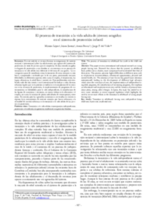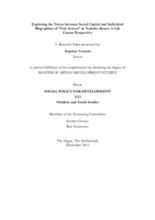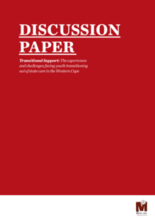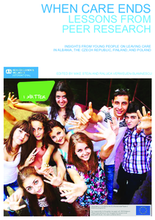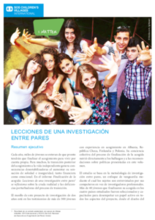Displaying 871 - 880 of 953
En este artículo se revisan diversas investigaciones de carácter nacional de España e internacional sobre los adolescentes que egresan del sistema de protección.
This article provides an outline of the early development of care and protection in Australia and New Zealand as a backdrop to an overview of child protection systems and policies and the current child protection profile in both countries. An overview of trends in relation to out of home care, including routes into care, care arrangements and permanency policies is provided.
Employing a life course perspective and drawing upon care leavers' stories, along with focus group discussions and views from staff, this paper explores the concept of social capital and the ways in which this influences their lives before care, in care and after care.
In 2012, Mamelani began an assessment of the content and focus of its transitional support programme. The aim was to consolidate its existing practice as well as to discover and implement new ways of ensuring more participants in its programme make a successful transition out of care.
In its Annual report (2011-2012), the Indian Ministry of Women and Child Development reports on progress in the implementation of the Integrated Child Protection Scheme (ICPS), a new policy and programmatic strategy that specifically articulates the need to move away in approach and services from over-reliance on institutional care and towards responses that support family based care.
This report presents the findings from a two-year peer research project which includes the testimony of more than 300 young people with care experience in Albania, the Czech Republic, Finland, and Poland. More than 40 care leavers from the four countries were selected and trained to play an active role in the all aspects of the projects. The interviews revealed widespread inadequacies regarding the process of leaving care, promoting the research team to draw up recommendations to address them.
El meollo de este proyecto de investigación de dos años está en los testimonios de más de 300 jóvenes con experiencia en acogimiento en Albania, República Checa, Finlandia y Polonia. Su conciencia colectiva del proceso de finalización de la acogida nutrió directamente a los hallazgos y a las recomendaciones sobre políticas presentadas en este volumen.
This study assesses reintegration trajectories of child soldiers in Burundi several years after demobilization. It looks broadly at socioeconomic and mental health indicators of a large group of former child soldiers and never recruited peers, both of who participated in an economic support program.
This data pack, produced by the Department for Education, aims to summarize national data about children who leave care aged 16 and over and outcomes of care leavers at age 19. The pack was also developed to help local authorities to compare their performance with others and to investigate issues such as age of leaving care and placement stability on the outcomes of care leavers.
The present study explories the preparation for adulthood experiences of young Ghanaian care-leavers with a particular focus on sources, needs and barriers to preparation for leaving care.

